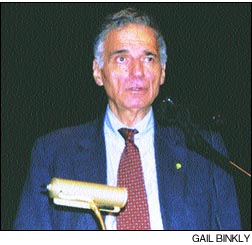|
Sept. 12, 2000 By Gail Binkly Ralph Nader — Green Party presidential candidate, consumer advocate and American icon — urged a crowd of 600 in Durango Friday night to beware of corporate power, fight pollution in all its forms, and never stop believing in their ability to bring about change.
"Huge change comes about little by little," he told the audience at Fort Lewis College’s concert hall, which was sold out for the event. "Everybody does their part." In the 1960s, he recalled, traveling by air meant sitting in planes filled with cigarette smoke. Nader and other activists decided that wasn’t right and sought to segregate smokers from non-smokers. "The response was unbelievably aggressive from the smokers and the tobacco companies," Nader said. Now, three decades later, smoking is banned outright on flights within the United States, and smokers’ claims that they would be unable to endure cross-continental flights without cigarettes have proven untrue. "You see how things change?" Nader asked. "Who’d ever have dreamed that Nelson Mandela would emerge from jail and be elected president of South Africa without any bloodshed? Who’d have dreamed the Berlin Wall would fall? That the KGB and CIA would have an exchange program?. . . "So when anybody says to you, ‘It can’t happen,’ you’ve got hundreds of examples where it can happen," Nader said. The 66-year-old lawyer, author and founder of numerous advocacy groups was on a three-day visit to the Southwest. He had spoken in Farmington earlier Friday, lectured in Montrose on Saturday and attended a rally in Denver on Sunday. He received a standing ovation upon his arrival on the stage at Fort Lewis and another at the conclusion of his talk. His speech ranged in topic from mass transit to genetic engineering to solar energy. Much of it was devoted to attacking large corporations for selling unsafe products, such as tobacco, and lying about their danger.
"Don’t rely on the industry to tell you the scientific truth, because either they cover it up — like Firestone and its tires — or they deliberately don’t do the research," he said. Smog came into existence in California as early as the 1920s, Nader said, but automakers for years refused to admit that internal-combustion vehicles had anything to do with it. Pneumoconiosis, a lung disease caused by particle-inhalation, was documented among coal-miners in England in the 1930s, but for decades afteward the American coal industry said there was no such disease. In the 1890s, lead was known to be toxic, Nader said, yet it was added to gasoline until the 1970s and is still present in many older homes with lead-based paint. Two hundred thousand children are harmed annually by exposure to old, peeling paint in tenements, he said. "Have you ever heard any company executive say, ‘Yes, our products are killing people and we’re going to stop’?" he asked, to audience laughter. The tobacco industry is the worst culprit, he said. "Look how many decades they refused to admit tobacco was in any way harmful to health," all the while tinkering with the nicotine levels in cigarettes to make them more addictive, Nader said. "There are people who want to execute heroin- and cocaine-dealers, but look how long the tobacco industry got away with it — and not only got away with it, but was regaled and reached the highest levels of political approbation," he said. "It’s more than a cause for a civil action and a tort remedy — it’s a cause for criminal prosecution of the executives. Because these are the big drug-dealers." Smog, radiation, cigarette smoke, hydrocarbons and sulfur emissions are all forms of pollution, an insidious type of violence done to human beings, Nader said. Likewise, biotechnology and genetic engineering is a form of pollution, he said, "perhaps the most fundamental, devastating kind of all." Corporations will "own our genes just the way the cotton plantations owned slaves if we don’t do something about it," he said, and even genetic engineering of plants poses risks. The number of acres of genetically engineeered corn, soybean and cotton in the United States has risen from 2 million in 1997 to 80 million last year, he said, but no one knows whether the technology is safe or how such crops may react with the rest of the environment. "We do know that every time a technology gets too far ahead of the basic science that has to be its governing discipline, it’s trouble, he said. "It happened with nuclear power." The nation needs to move ahead faster with solar energy rather than relying on fossil fuels and nuclear reactors, Nader said. But oil and electric companies aren’t motivated to seek alternatives or become more efficient as long as they can make profits selling gasoline-hogging SUVs and light bulbs so antiquated there was no improvement in them from the 1930s to the 1980s, he said. "There’s no justification whatsoever that a technology (the internal-combustion engine) invented in 1888 is still with us today, other than it’s a marvelous opportunity for spare-parts production and repair and a gas-guzzler without peer." Nader called for the legalization of industrial hemp — "the most versatile domesticated plant in the world" — as an environmentally friendly source of rope, paper, textiles, lubricants, and thousands of other products. Hemp can be imported from other countries but not grown here, thanks to the 1937 Marijuana Act and "medieval superstition," he said. "They think industrial hemp is the stalking horse for marijuana," he said. "Industrial hemp cross-pollinates and dilutes marijuana, but General (Barry) McCaffrey (the nation’s drug czar) doesn’t get to that level of detail." Hemp grows rapidly in many climates and requires little water or pesticide use, but the Clinton-Gore Administration refuses to take it off the DEA’s prohibited list, Nader said. "They have no guts at all, no courage, no foresight," he said. "They say they’re environmentalists and want less reliance on imported oil, which industrial hemp can give us," yet won’t legalize it. Nader also urged an increase in organic agriculture to help preserve the small-farm economy and restore farmlands. "We’re losing as big a percentage of crops today (to insects) as in the 1940s and we’re using hundreds of times the pesticides, because of the (bugs’) resistance factor," he said. Runoff of pesticides and fertilizers is contaminating waterways; the Gulf of Mexico now harbors a dead zone as large as West Virginia, believed to be caused by fertilizer runoff. During a press conference and an audience question session, Nader expressed views on a variety of other topics:
He asked the audience, "How many of you want Congress to vote their conscience?" When nearly everyone raised an arm, he said, "Then why don’t you vote your conscience — instead of your fears?" |
||||
|
Copyright © 2000 the Cortez
Journal. All rights reserved. |

